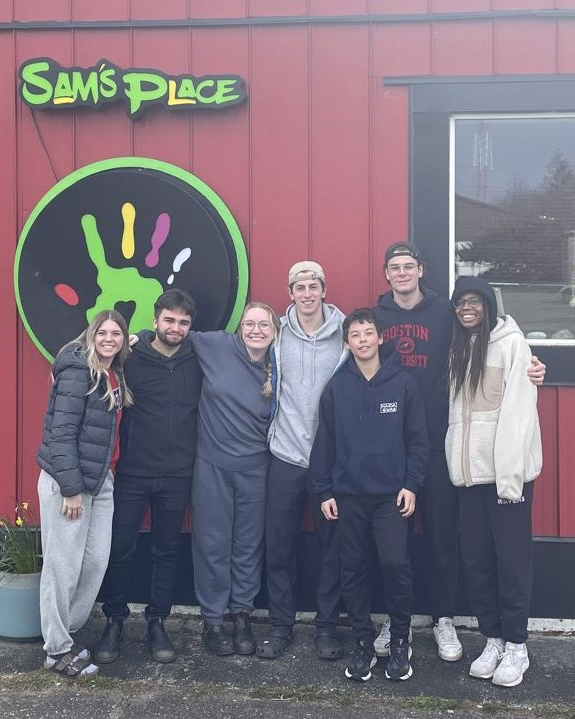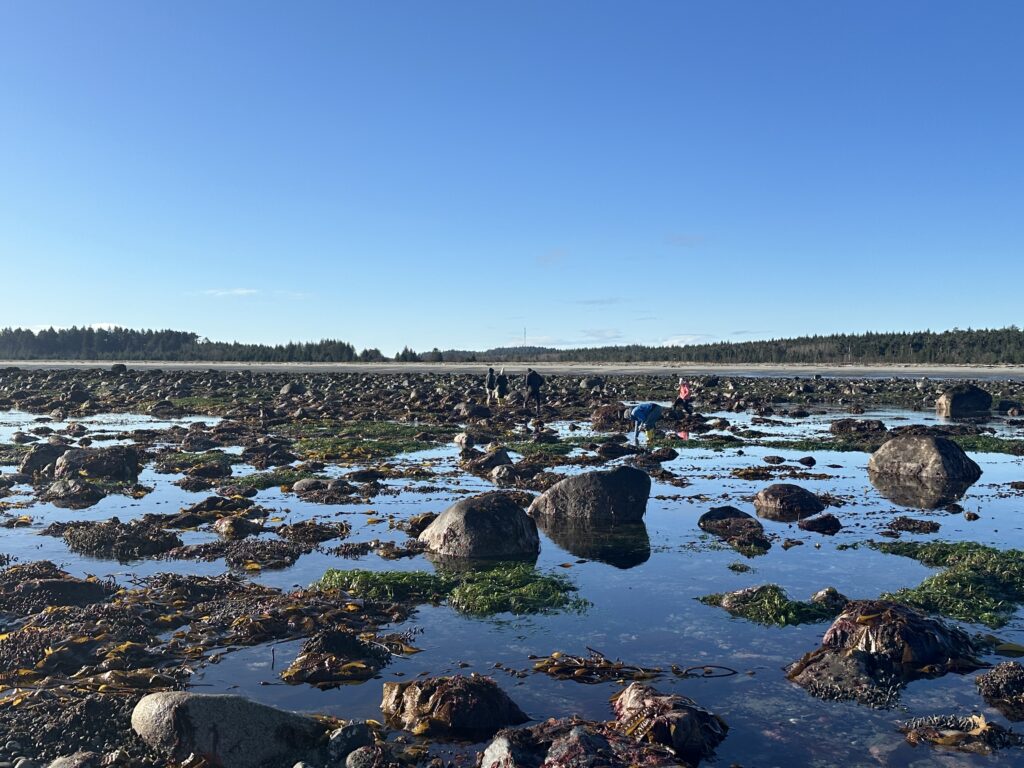Sprott Students Work with Indigenous Community to Turn Kelp into Fertilizer
Jordan Evans, a third-year Bachelor of Commerce student, travelled to Masset, Haida Gwaii in April as part of the course BUSI 4117 Developing Creative Thinking. Jordan and his class partner Simon Kerr, a Carleton Communications student, worked all semester on an interdisciplinary, collaborative project that looked at turning kelp into agricultural fertilizer.
“I’m an Indigenous student at Sprott, and there aren’t many other Indigenous students. When I saw that there were opportunities to go to northern communities and work on projects there, I thought that was a really cool opportunity—and I took it,” said Jordan.

BUSI 4117 is a unique course through which students apply design thinking and an entrepreneurial mindset to collaborate with members of remote communities on projects that addresss challenges identified by the communities. Carleton business students partner with Industrial Design students who help to design prototypes and technical solutions.
The Village of Masset is a small fishing village located on Graham Island, along the north-west coast of British Columbia. With bountiful access to kelp, people in the community have been placing kelp on top of their gardens for many years to add nutrients. Building on this, Carleton industrial design student, Ashley Koid, came up a concept of a device a couple of years ago to leverage ultrasonic technology to extract nutrients from kelp to be mixed with water to produce a fertilizer for gardens.

Dan Schulbeck, a science teacher who runs the food program at Gudangaay Tlaats’gaa Naay Secondary School in Masset, worked closely with Jordan’s group and industrial design students on this kelp-to-fertilizer initiative. While industrial design students worked on the technology, Jordan’s group did some preliminary testing of the kelp solution with Dan and students in his food program, and explored the business application behind the device. The ability to turn the kelp into fertilizer has the potential to increase agricultural yields and make fresh food more accessible in the community.
Jordan’s group also worked with Old Masset Village Council, where module farms, called grocery units, were being installed in the community. This will allow farming to take place year-round in these shipping containers. Jordan and Simon proposed a business-to-business sales model where Old Masset could purchase the kelp-based fertilizer from Dan in Masset.
As the semester wraps up, some projects are at the stage where they are passed off to the community. Others, like the kelp fertilizer project, are taken on by the next year’s cohort of BUSI 4117 students.
Students in BUSI 4117 have the opportunity to participate in one of three course options. Jordan chose Northern Lights: Canadian North, where students engage in research and co-design with members of Mayo, Yukon or Masset, Haida Gwaii. The second option was From Buckets to Rainbarrels where the students visit the Maasai district of Longido, Tanzania to work on various projects. The final option was Courts for Change, where groups work with varsity athletes and students from Industrial Design to design and build sport and recreation facilities and wellness programs in various countries.
The course BUSI 4117 has been running for seven years. Professor Rob Smart explained that every year they meet with the community leaders to discuss what their needs are and what projects they would like students to focus on.
This year, six Carleton students who were part of Northern Lights were assigned to three different projects within the Masset community. One was the kelp fertilizer project.
Another looked at creating a student culture exchange program through sport within Haida communities. The third project looked at using a 3D printer to share artwork, encourage students to embrace technology, and connect makers and young people in the community.
The students visited Masset from April 6-14. Since the kelp project involved weeks-long experiments, it did not require as much hands-on work during the visit. Jordan’s group instead spent time helping with Dan’s class and the food program at the high school, assisting Dan with his 2,000 sq ft of growing space and maintaining his greenhouses, and giving tours of the greenhouse to kindergarten classes.

“I’m from an Indigenous community in Akwesasne, and that community has struggled a lot with sovereignty, like territorial sovereignty,” said Jordan. “Food sovereignty is not the same thing, but it’s kind of along the same lines. And it meant a lot to me to support a project that supported that.”
Jordan, who is concentrating in entrepreneurship with a minor in legal studies, would like to become a lawyer. On top of learning about Haida culture and the community, a valuable lesson he took from the course was how to become more comfortable with ambiguity. This project came with a lot of unknowns, and Jordan had to be able to pivot and change the scope of the project as the need arose.
Throughout the semester, students also organized fundraisers to raise money for their trips. Jordan’s group ran a “grand in your hand” fundraiser, where they sold raffle tickets to win $1,000.
“I also really like the fundraising aspect of it. Part of our course grade was fundraising for the trip. That was at the beginning of the semester. So, I think that was really good experience to engage in the Sprott community as well,” said Jordan.
With the semester wrapping up, Jordan expressed how unique this course was and why he would recommend it to Carleton students.
“I think it’s really good experience. It’s a different kind of learning than I’ve gotten in my whole academic career,” shared Jordan. “It’s definitely an adventure.”